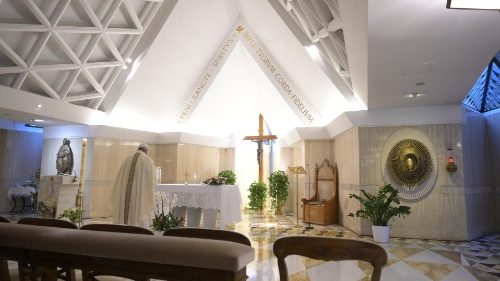The Pope: let us be consoled by the God of closeness, truth and hope

In the Mass at Santa Marta, Francis recalls the World Day of the Red Cross and Red Crescent: God bless those who work in these institutions that do so much good. In his homily, he stressed that the Lord always consoles in closeness, truth and hope
Francis presided over the Mass at Casa Santa Marta (INTEGRAL VIDEO) on Friday of the fourth week of Easter and on the day of the Supplication to Our Lady of Pompeii. In the introduction, he recalled today's World Red Cross Day:
Today is celebrated the World Day of the Red Cross and Red Crescent. We pray for the people who work in these worthy institutions: that the Lord bless their work that is doing so much good.
In the homily, the Pope commented on today's Gospel (Jn 14: 1-6) in which Jesus says to his disciples: «Do not be troubled by your heart. Have faith in God and have faith in me too. In my Father's house there are many dwellings (...) When I go and have prepared a place for you, I will come again and take you with me, so that where I am you may also be ».
This conversation between Jesus and the disciples - Francis recalled - takes place during the Last Supper: "Jesus is sad and everyone is sad: Jesus said he would be betrayed by one of them" but at the same time he begins to console his : "The Lord consoles his disciples and here we see how it is the way of consoling Jesus. We have many ways of consoling, from the most authentic, from the closest to the most formal, like those telegrams of condolences: 'Deeply grieved for ...' . It does not console anyone, it is a fake, it is the consolation of formalities. But how does the Lord console himself? This is important to know, because we too, when in our life we must pass moments of sadness "- exhorts Francis - we learn to" perceive what the true consolation of the Lord is ".
"In this passage of the Gospel - he observes - we see that the Lord always consoles in closeness, with truth and hope". These are the three traits of the Lord's consolation. "In proximity, never far away." The Pope recalls "that beautiful word of the Lord:" I am here with you ". "Many times" is present in the silence "but we know that He is there. He is always there. That closeness which is the style of God, even in the Incarnation, to draw near to us. The Lord consoles in closeness. And he doesn't use empty words, on the contrary: he prefers silence. The strength of closeness, of presence. And it speaks little. But it's close. "
A second trait “of Jesus' way of consoling is the truth: Jesus is truthful. He doesn't say formal things that are lies: 'No, don't worry, everything will pass, nothing will happen, it will pass, things will pass ...'. No. It tells the truth. It does not hide the truth. Because in this passage he himself says: 'I am the truth'. And the truth is: 'I am leaving', that is: 'I will die'. We are facing death. It is the truth. And he says it simply and also with mildness, without hurting: we are facing death. It does not hide the truth ”.
The third trait of Jesus' consolation is hope. He says, “Yes, it's a bad time. But don't let your heart be troubled: have faith in me too ", because" in my Father's house there are many dwellings. I'm going to prepare a place for you. " He first goes to open the doors of that house where he wants to take us: "I will come again, I will take you with me so that where I am you too". “The Lord comes back every time someone of us is on the way to leave this world. 'I will come and take you': hope. He will come and take us by the hand and bring us. It does not say: 'No, you will not suffer: it is nothing'. No. He says the truth: 'I am close to you, this is the truth: it is an ugly moment, of danger, of death. But don't let your heart be troubled, stay in that peace, that peace that is the basis of every consolation, because I will come and by the hand I will take you where I will be '".
“It is not easy - says the Pope - to be consoled by the Lord. Many times, in bad times, we get angry with the Lord and do not let him come and speak to us like this, with this sweetness, with this closeness, with this meekness, with this truth and with this hope. We ask for grace - it is Francis' final prayer - to learn to let ourselves be consoled by the Lord. The consolation of the Lord is truthful, it does not deceive. It's not anesthesia, no. But it is close, it is truthful and it opens the doors of hope to us ”.
Vatican source Vatican official website